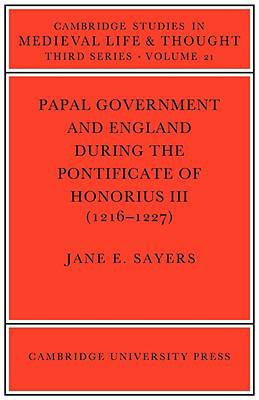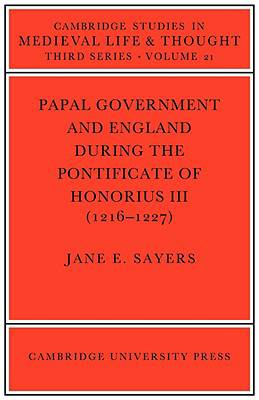
- Afhalen na 1 uur in een winkel met voorraad
- Gratis thuislevering in België vanaf € 30
- Ruim aanbod met 7 miljoen producten
- Afhalen na 1 uur in een winkel met voorraad
- Gratis thuislevering in België vanaf € 30
- Ruim aanbod met 7 miljoen producten
Zoeken
Papal Government and England During the Pontificate of Honorius III (1216 1227)
Jane E Sayers
€ 60,95
+ 121 punten
Omschrijving
This study of the administrative 'revolution' of the thirteenth-century papacy investigates the background and career of Honorius III, who was deeply involved in the developing administration of Chamber and Chancery from the late twelfth century, and reveals a picture of evolution rather than revolution in the papal offices of state. Honorius's Chancery is subjected to a vigorous examination. Valuable appendices list all the known papal scribes and provide diplomatic commentaries. Tables indicate details about the registers and the registrative system. The central machinery is shown in action, particularly in dealing with English affairs and petitioners and Honorius's place in the development of canon law is discussed in relation to the English background and experience.
Specificaties
Betrokkenen
- Auteur(s):
- Uitgeverij:
Inhoud
- Aantal bladzijden:
- 312
- Taal:
- Engels
- Reeks:
- Reeksnummer:
- nr. 21
Eigenschappen
- Productcode (EAN):
- 9780521073318
- Verschijningsdatum:
- 28/08/2008
- Uitvoering:
- Paperback
- Formaat:
- Trade paperback (VS)
- Afmetingen:
- 140 mm x 216 mm
- Gewicht:
- 399 g

Alleen bij Standaard Boekhandel
+ 121 punten op je klantenkaart van Standaard Boekhandel
Beoordelingen
We publiceren alleen reviews die voldoen aan de voorwaarden voor reviews. Bekijk onze voorwaarden voor reviews.











